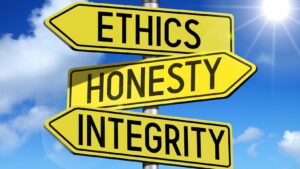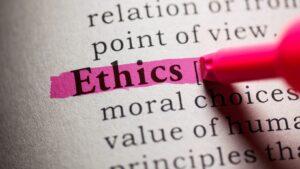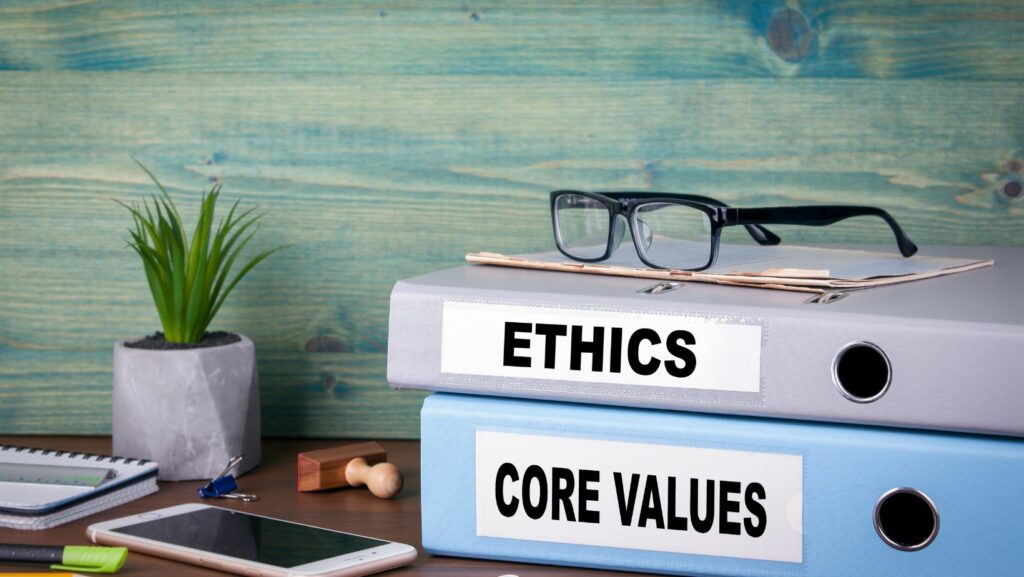Media Ethics
- Importance of Media Ethics: Media ethics is essential in today’s fast-paced information environment, guiding journalists in accurately representing diverse perspectives while fostering public trust.
- Core Principles: Media ethics revolves around key principles such as truthfulness, accuracy, fairness, impartiality, and respect for privacy and confidentiality, which are vital for responsible reporting.
- Challenges in the Digital Age: The rise of digital platforms has blurred the lines between professional journalism and amateur content creation, leading to challenges in maintaining accuracy and accountability.
- Role of Regulatory Bodies: National and international regulatory bodies, like the FCC and IFJ, establish standards for ethical media practices and enforce compliance to ensure responsible journalism.
- Impact of Misinformation: Misinformation and disinformation pose significant threats to public trust, necessitating rigorous fact-checking and transparency to maintain the integrity of information dissemination.
- Viewer Responsibility: Media consumers must critically evaluate sources and promote accountability in reporting, contributing to a healthier information ecosystem.
In an age where information flows freely and rapidly, media ethics has never been more crucial. Journalists and content creators face the challenge of balancing the pursuit of truth with the responsibility to their audience. As they navigate complex narratives and diverse perspectives, the ethical considerations that guide their work can shape public perception and trust.
Media ethics isn’t just about adhering to guidelines; it’s about fostering accountability and integrity in storytelling. With the rise of misinformation and sensationalism, understanding the principles of ethical reporting is essential for both professionals and consumers alike. By exploring the foundations of media ethics, one can appreciate how these standards influence the landscape of modern communication and the role they play in a democratic society.
Understanding Media Ethics
Media ethics encompasses a set of principles guiding journalists and content creators in their work. These principles include accuracy, fairness, and transparency. Accurate reporting requires thorough fact-checking to ensure the validity of information presented. Fairness involves giving a voice to diverse perspectives, especially those that are often marginalized. Transparency mandates disclosing sources and potential conflicts of interest.
Key ethical frameworks in media ethics include the Society of Professional Journalists (SPJ) Code of Ethics and the Online News Association’s (ONA) Ethical Guidelines. These frameworks emphasize the importance of minimizing harm, acting independently, and being accountable to the audience. Adhering to these guidelines fosters a relationship of trust between the media and the public.
Understanding media ethics is crucial, as the proliferation of misinformation creates challenges for ethical reporting. Journalists must navigate biases, sensationalism, and the pressures of immediate news cycles. Ethical journalism not only combats misinformation but also supports informed citizenry, thereby strengthening democratic societies.
Media consumers also play a vital role in this ecosystem. They must critically evaluate information sources and demand accountability from media outlets. By understanding media ethics, consumers can better discern credible information from sensationalist content, contributing to a healthier information landscape.
Historical Context of Media Ethics
Media ethics evolved significantly over the decades, shaped by advancements in technology and shifts in societal norms. Historical events have influenced how ethical standards develop and adapt within the media landscape.
Evolution of Ethical Standards
Ethical standards in media began emerging in the early 20th century alongside the rise of journalism as a profession. The establishment of formal guidelines sought to address issues of accuracy and integrity. In 1909, the American Society of Newspaper Editors adopted a Code of Ethics focusing on principles like truthfulness and respect for privacy.
During the 1960s and 1970s, significant events like the Vietnam War and civil rights movements prompted journalists to reassess their roles and responsibilities. The Society of Professional Journalists (SPJ) introduced its first formal Code of Ethics in 1926, which has undergone revisions to incorporate digital age challenges. The emergence of digital platforms in the 21st century led to new ethical dilemmas, including plagiarism and misinformation, compelling media organizations to establish more comprehensive ethical frameworks.
Key Figures and Their Contributions
Several influential figures have shaped the discourse on media ethics. John Dewey emphasized the importance of communication in a democratic society, advocating for responsible journalism. Walter Lippmann’s theories on public opinion emphasized the media’s role in shaping perceptions, leading to calls for journalists to act with integrity.
Additionally, industry leaders such as Edward R. Murrow championed journalistic ethics by adhering to standards that prioritized truth over sensationalism. More recently, social media critics like Eli Pariser have spotlighted the ethical implications of algorithms and echo chambers, urging a reevaluation of accountability in digital journalism.
Together, these figures and evolving standards reflect the ongoing journey toward ethical rigor in media practices, crucial for maintaining public trust and fostering informed discourse.
Core Principles of Media Ethics
Media ethics centers on several core principles that guide ethical journalism practices, ensuring accountability and integrity in storytelling.
Truthfulness and Accuracy
Truthfulness and accuracy serve as foundational elements of media ethics. Journalists must verify information before dissemination, utilizing multiple sources to ensure reliability. The SPJ Code of Ethics emphasizes the significance of reporting facts honestly and refraining from fabricating or misrepresenting events. By prioritizing accuracy, media professionals sustain public trust and reinforce their credibility.
Fairness and Impartiality
Fairness and impartiality demand that journalists present diverse perspectives, striving for balanced reporting. The ONA’s Ethical Guidelines highlight the importance of contextualizing information by providing relevant viewpoints, particularly in controversial issues. Journalists must avoid biases and ensure all subjects receive equitable representation, which fosters a well-informed audience capable of engaging with varied opinions.
Privacy and Confidentiality
Privacy and confidentiality protect individuals from unwarranted intrusion. Journalists must respect the privacy rights of persons and consider ethical implications when publishing sensitive information. The SPJ Code asserts that confidentiality should be safeguarded, particularly for sources sharing information under the condition of anonymity. This principle reinforces trust between journalists and their sources, encouraging the dissemination of critical information while honoring individual rights.
Challenges in Media Ethics
Media ethics faces significant challenges, especially in the evolving landscape of content creation and distribution. These challenges impact how information is gathered, presented, and perceived by the public.
Digital Age Dilemmas
Digital platforms create unique dilemmas for media ethics. With the rise of social media, anyone can publish information, leading to blurred lines between professional journalists and amateur content creators. This democratization of information can decrease accountability, making it harder to ascertain credible sources.
Journalists encounter difficulties in maintaining standards of accuracy while competing for audience attention in a crowded online space. The urgency to produce content rapidly often compromises thorough fact-checking. Additionally, algorithm-driven content prioritization can skew narratives, favoring sensationalism over substance.
Misinformation and Disinformation
Misinformation and disinformation represent critical challenges in media ethics. Misinformation refers to the unintentional spread of false information, whereas disinformation involves deliberate deception. Both can erode public trust in media institutions and hinder informed debates.
Media outlets grapple with the responsibility of correcting misinformation while upholding transparency. Rapidly changing news cycles complicate this task, often leading to retractions that attract less attention than the original false claims. Consequently, verifying information has become paramount, emphasizing the need for robust editorial standards that prioritize accuracy and context in reporting.
Addressing these challenges requires a collective effort among journalists, media organizations, and consumers to foster an environment of ethical clarity and informed communication.
The Role of Regulatory Bodies
Regulatory bodies play a crucial role in establishing and maintaining media ethics standards. Their regulations guide journalists and content creators, ensuring responsible reporting and accountability.
National and International Guidelines
National and international guidelines provide frameworks for ethical media practices. Organizations like the Federal Communications Commission (FCC) in the U.S. and the European Union’s Audiovisual Media Services Directive (AVMSD) set rules for content fairness, balance, and transparency. These guidelines promote standards that protect freedom of expression while ensuring public interest and safeguarding democratic values. Additionally, various journalist associations worldwide, such as the International Federation of Journalists (IFJ), offer ethical codes that enhance industry practices.
| Regulatory Body | Guidelines/Standards |
|---|---|
| Federal Communications Commission (FCC) | Establishes rules for fair media practices in broadcasting. |
| European Union (EU) | Implements the Audiovisual Media Services Directive to regulate audiovisual content. |
| International Federation of Journalists (IFJ) | Provides global ethical standards for journalists, promoting responsible reporting. |
Enforcement Mechanisms
 Enforcement mechanisms are vital for upholding ethical journalism. Regulatory bodies monitor compliance through licensing requirements, content reviews, and public complaints. Non-compliance can result in penalties such as fines, suspension of licenses, or public reprimands. For instance, the FCC enforces communications regulations, while media councils in various countries address ethical complaints from the public. Additionally, self-regulatory bodies, like the Press Complaints Commission in the U.K., manage grievance procedures, allowing individuals to report ethical breaches and seek redress. These mechanisms collectively strengthen adherence to ethical standards and nurture public trust in media institutions.
Enforcement mechanisms are vital for upholding ethical journalism. Regulatory bodies monitor compliance through licensing requirements, content reviews, and public complaints. Non-compliance can result in penalties such as fines, suspension of licenses, or public reprimands. For instance, the FCC enforces communications regulations, while media councils in various countries address ethical complaints from the public. Additionally, self-regulatory bodies, like the Press Complaints Commission in the U.K., manage grievance procedures, allowing individuals to report ethical breaches and seek redress. These mechanisms collectively strengthen adherence to ethical standards and nurture public trust in media institutions.
Modern Journalism
Media ethics plays a crucial role in shaping the landscape of modern journalism. As the information environment continues to evolve rapidly, the principles of accuracy, fairness, and transparency become even more essential. Upholding these standards not only fosters public trust but also strengthens the integrity of media institutions.
Both journalists and consumers share the responsibility of promoting ethical practices. By demanding accountability and critically evaluating sources, individuals can contribute to a healthier media ecosystem. The ongoing dialogue around media ethics will remain vital as society navigates the complexities of information in the digital age, ensuring that responsible storytelling prevails.

